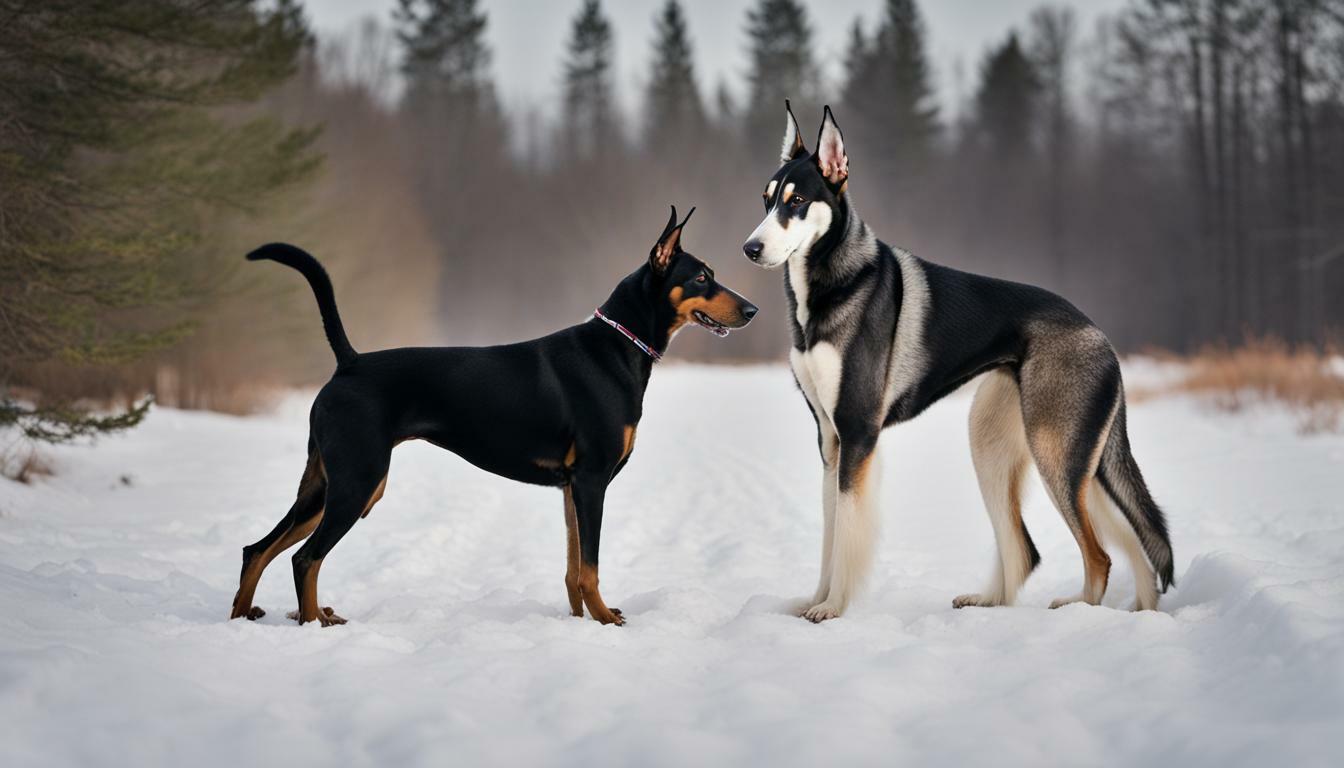Are you trying to decide between getting a Husky or a Doberman as your next pet? Both breeds have their unique traits and characteristics that make them lovable companions, but there are some key differences to consider before making your choice. In this article, we will explore the distinctions between Huskies and Dobermans, including their physical characteristics, temperament, trainability, grooming needs, health considerations, sociability, and more. By the end, you’ll have a better understanding of which breed may be the perfect fit for you.
To start, let’s take a closer look at the physical differences between Huskies and Dobermans. From their size and body structure to their coat types, each breed possesses unique features that set them apart. Understanding these variations will help you visualize their appearances and determine which aesthetic appeals to you the most.
Physical Characteristics
When it comes to physical characteristics, Huskies and Dobermans differ significantly in size and appearance. Huskies are known for their medium to large size, standing at 20-24 inches tall at the shoulder and weighing between 35-60 pounds (depending on gender). They have a strong and muscular build with a deep chest and a thick, double coat that comes in various colors, including black, gray, white, and copper. Huskies have striking almond-shaped eyes that can be blue, brown, or a combination of both, giving them a captivating and intense gaze.
In contrast, Dobermans are large dogs, typically measuring between 24-28 inches tall at the shoulder and weighing around 60-100 pounds. They have a lean and athletic physique with a sleek, short coat that comes in colors such as black, red, blue, and fawn. Dobermans have an elegant and regal appearance, with their cropped ears and docked tails adding to their distinctive look. Their eyes are almond-shaped and usually range in color from light brown to dark brown.
Here’s a visual comparison of the size difference between a Husky and a Doberman:
| Breed | Height at Shoulder | Weight |
|---|---|---|
| Husky | 20-24 inches | 35-60 pounds |
| Doberman | 24-28 inches | 60-100 pounds |
As seen in the table above, Dobermans are generally taller and heavier than Huskies, making them a larger breed overall.
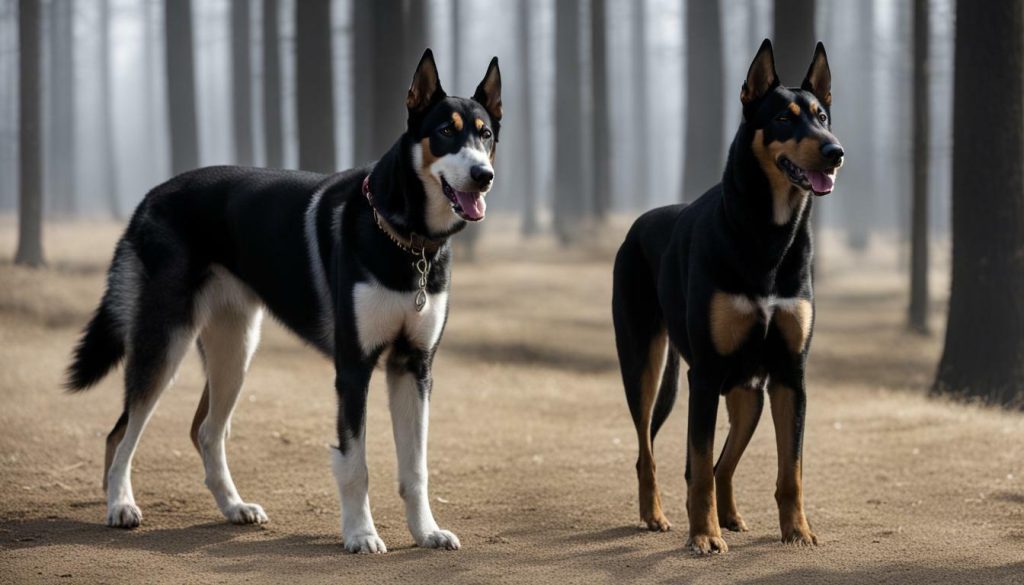
“Huskies are medium to large-sized dogs, while Dobermans are considered large in size. Huskies stand at 20-24 inches tall and weigh between 35-60 pounds, whereas Dobermans measure 24-28 inches in height and weigh around 60-100 pounds.”
It’s important to consider these size differences when choosing a breed, as it can impact factors such as living space requirements, exercise needs, and overall compatibility with your lifestyle. Both Huskies and Dobermans can make wonderful companions, but their distinct size and appearance set them apart.
When deciding on the perfect pet for you and your family, understanding the differences between breeds is crucial. In this article, we will compare the popular Husky and Doberman breeds to help you make an informed decision. In section 3 of this article, we will explore the similarities between Huskies and Dobermans to give you a comprehensive understanding of these two unique breeds.
Dobermans are highly intelligent, athletic, and alert, making them great guard dogs. They are loyal and affectionate towards their families. Dobermans have a history as police and military dogs and can also work as therapy, service, and emotional support animals.
Huskies, on the other hand, are energetic dogs known for their loyalty. They are sociable with other dogs and children. Huskies were bred to work together in a pack and are fast runners.
In terms of grooming and health, there are some notable differences between the two breeds. Dobermans have low grooming needs with a single coat that sheds gradually throughout the year. They are prone to ear infections and have a higher susceptibility to certain health issues such as bloat, prostate cancer, hip dysplasia, and von Willebrand’s disease.
Huskies have moderate grooming needs due to their fluffy double coat. They shed more than Dobermans and require regular brushing. While generally healthy, Huskies may be susceptible to hip dysplasia, hypothyroidism, and eye disorders.
Both breeds have an average lifespan of around 10-14 years. Dobermans are easier to train, while Huskies can be more stubborn. Huskies are sociable and friendly towards everyone, while Dobermans may not tolerate strangers or other pets as well.
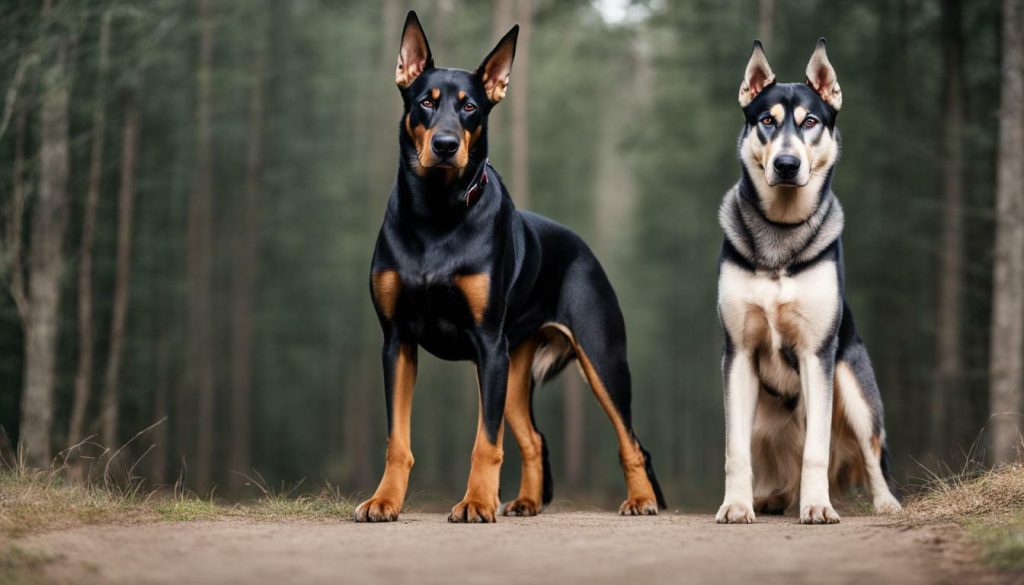
Ultimately, the choice between a Husky and a Doberman depends on individual preferences and the environment. Huskies are better for active owners in colder climates, while Dobermans are a good choice for those looking for a short-haired dog with minimal shedding. It’s important to consider the specific needs and characteristics of each breed before making a decision.
Temperament: Similarities Between Husky and Doberman
Despite their physical differences, Huskies and Dobermans share some notable similarities in temperament. Both breeds exhibit loyalty and affection towards their families, making them excellent companions. They are known for their protective instincts and can serve as reliable guard dogs, ensuring the safety of their loved ones.
Huskies and Dobermans are intelligent breeds that require mental stimulation and consistent training. While Dobermans tend to be more eager to please their owners and are generally easier to train, Huskies can be more independent and may require patience and persistence during the training process.
Another shared characteristic between these breeds is their sociability. Huskies, being pack-oriented dogs, are friendly and sociable with people and other dogs. They often thrive in social environments and can have a playful nature. Dobermans, on the other hand, can be more reserved with strangers, but they are usually loyal and affectionate towards their families. With proper socialization, they can coexist harmoniously with other pets in the household.
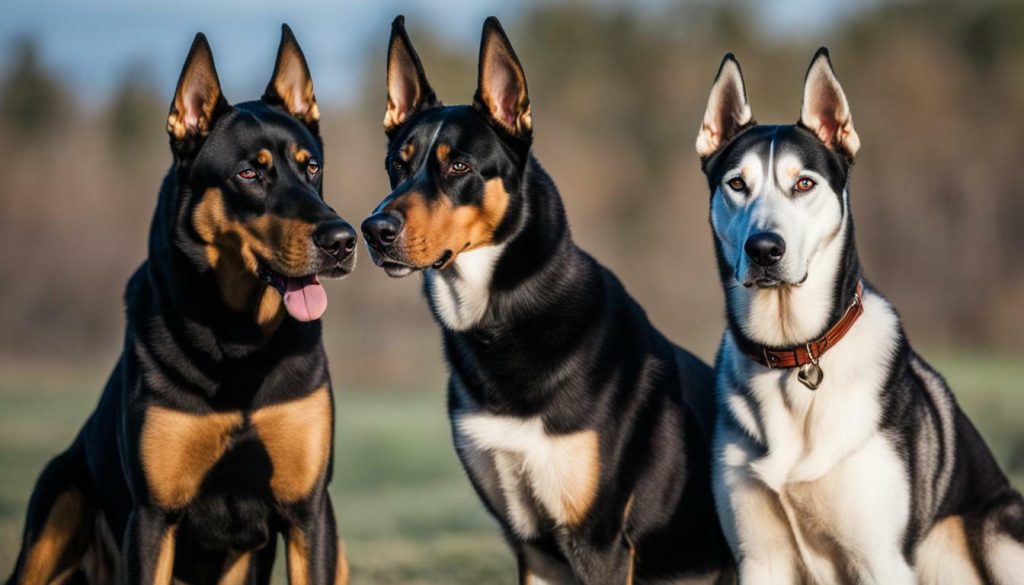
It’s important to note that individual temperament can vary within each breed, as temperament is influenced by various factors including genetics, socialization, and training. While Huskies and Dobermans share some common traits, it’s essential to spend time with both breeds and understand their specific temperaments to determine which one aligns best with your lifestyle and preferences.
| Temperament | Husky | Doberman |
|---|---|---|
| Loyalty | High | High |
| Affection | High | High |
| Trainability | May be stubborn, requires patience and persistence | Eager to please, easier to train |
| Sociability | Friendly and sociable with people and other dogs | Reserved with strangers, loyal to family |
Quote:
“Whether you choose a Husky or a Doberman, understanding their temperament is crucial in ensuring a compatible match for your household. Both breeds have unique qualities and it’s important to consider your lifestyle, training abilities, and the level of sociability you desire in a dog.” – Canine Expert
By considering the temperamental similarities and differences between Huskies and Dobermans, you can make an informed decision when choosing your perfect pet. Whether you prefer the sociable and energetic nature of a Husky or the loyal and protective temperament of a Doberman, both breeds can bring joy and companionship to your life.
Trainability and Exercise Needs of Huskies
When deciding on the perfect pet for your household, it’s essential to consider their trainability and exercise requirements. This section will focus on the trainability of Huskies, their intelligence, and specific needs when it comes to physical activity.
Huskies are known for their independent nature, which can make training more challenging compared to other breeds. They are intelligent dogs but can be stubborn at times, requiring patience and consistency in their training approach. It’s important to establish yourself as the pack leader and use positive reinforcement techniques to motivate and engage your Husky.
Exercise is vital for Huskies as they have a high energy level and were originally bred to work in packs as sled dogs. Regular physical activity helps them burn off excess energy, prevents destructive behaviors, and promotes overall well-being. Aim for at least 60-90 minutes of exercise each day, which can include brisk walks, jogging, hiking, and interactive play sessions.
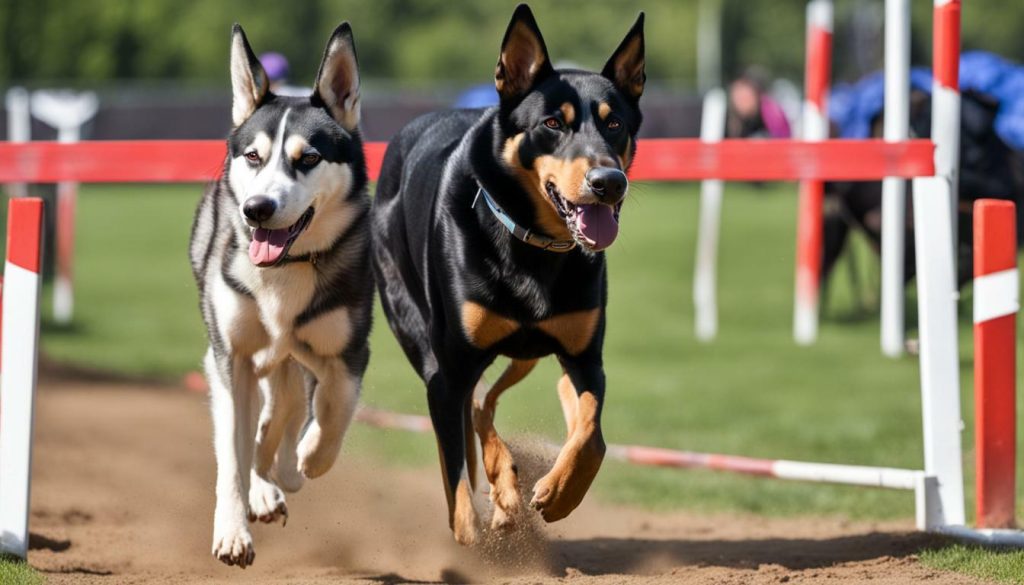
By providing your Husky with sufficient mental and physical stimulation, you can help prevent boredom-related issues like excessive digging or chewing. Engaging in activities that challenge their problem-solving skills, such as puzzle toys or obedience training, can also contribute to their overall development and happiness.
It’s important to note that Huskies have a high prey drive and should always be supervised or securely fenced when off-leash. They are known for their escape artist abilities and should be kept in a secure outdoor space to prevent them from running off.
When considering a Husky as your ideal pet, be prepared to invest time and effort in their training and exercise needs. While their independent nature may present challenges, their loyalty, beauty, and playful nature make them a rewarding companion for the right owner.
Trainability: Husky vs. Doberman
Training a Husky requires patience and consistency due to their independent nature, making it essential to understand their unique trainability. Huskies are intelligent dogs, but they can be stubborn and have a strong prey drive. They possess a free-spirited personality and may not always listen to commands unless they see value in doing so. Early socialization and positive reinforcement training methods are crucial for a Husky’s development.
On the other hand, Dobermans are known for their trainability and eagerness to please their owners. They are highly intelligent and learn quickly, making them easy to train. Dobermans excel in obedience training and are often used in various working roles. Their willingness to learn and their sharp minds make them a popular choice for owners seeking a trainable and well-behaved companion. Consistent training methods and positive reinforcement are key to nurturing their natural abilities.
It’s important to note that both breeds require mental stimulation and plenty of exercise to prevent boredom and destructive behaviors. A bored Husky or Doberman may resort to digging, chewing, or excessive barking. Providing them with structured training sessions, interactive toys, and challenging activities will help keep their minds engaged and fulfill their need for mental enrichment.
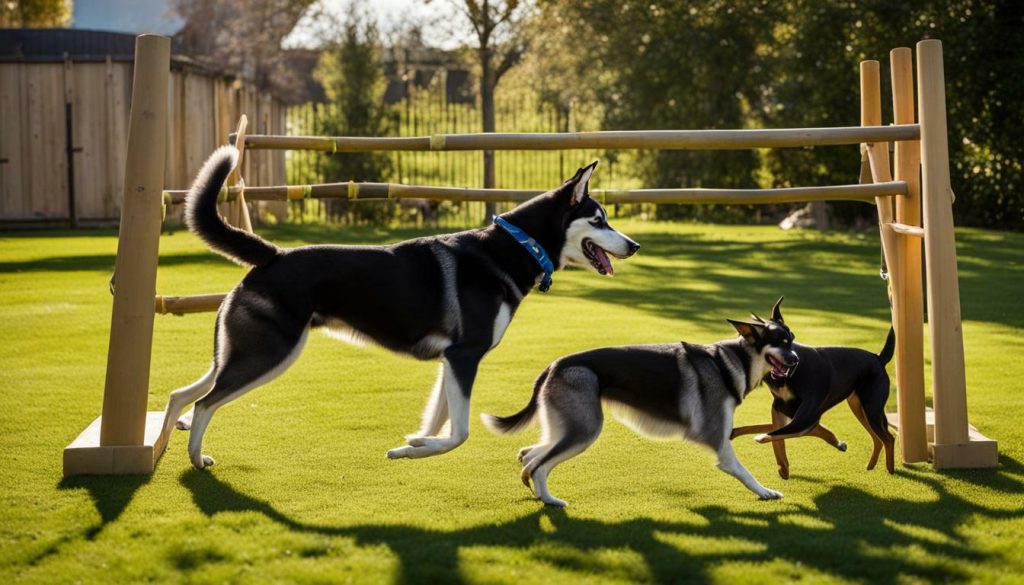
“When training your Husky or Doberman, remember to keep sessions short and enjoyable to maintain their focus and motivation. Use positive reinforcement techniques such as treats, praise, and rewards to reinforce desired behaviors. Consistency is key – establish clear rules and expectations, and be patient with your dog’s progress. Seek professional help or enroll in obedience classes if needed, as expert guidance can provide valuable insights and support.”
By understanding the distinct trainability of Huskies and Dobermans, you can tailor your training approach to suit their individual needs. Both breeds have their unique challenges and rewards when it comes to training, and with the right techniques and commitment, you can nurture a well-behaved and obedient pet.
| Trainability | Husky | Doberman |
|---|---|---|
| Intelligence | High | High |
| Ease of Training | Challenging | Easy |
| Independence | High | Low |
| Prey Drive | Strong | Moderate |
| Trainability Rating | 3.5/5 | 4.5/5 |
Table: Comparative Trainability Traits of Huskies and Dobermans.
When it comes to choosing your perfect pet, there are many factors to consider. One important decision is whether to bring home a Husky or a Doberman. These two breeds have distinct characteristics that may influence your choice. In this section, we will explore the differences between Huskies and Dobermans, focusing on their physical attributes, temperament, trainability, grooming needs, health, and sociability.
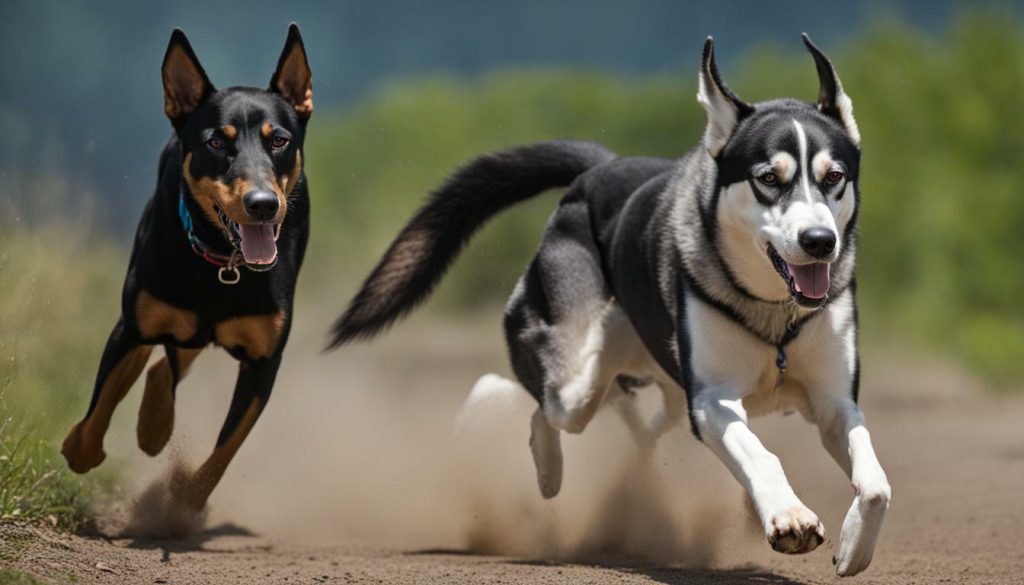
Trainability
Dobermans are highly trainable dogs known for their intelligence and eagerness to please, making them a suitable choice for those seeking a trainable companion. They excel in obedience training and are quick learners. With proper guidance and positive reinforcement techniques, Dobermans can easily grasp commands and perform various tasks. Their strong work ethic and natural protective instincts make them excellent candidates for advanced training, such as search and rescue or therapy work.
Huskies, on the other hand, can be more independent and stubborn, which can make training a bit more challenging. They have a free-spirited nature and may display a “what’s in it for me?” attitude. However, with patient and consistent training methods, Huskies can still achieve great results. It is crucial to establish yourself as a firm and consistent leader while using positive reinforcement techniques. Focusing on mental stimulation and providing them with a job or purpose will help keep their attention and make training sessions more enjoyable for both you and your Husky.
When it comes to training, it’s important to remember that each dog is an individual, and their personality and temperament can play a role in their trainability. While Dobermans may generally be easier to train, Huskies can still excel with the right approach and dedication. Consistency, positive reinforcement, and patience are key in successfully training both breeds.
“Training a dog is like raising a child. It requires time, effort, and commitment. The more consistent and positive you are in your training methods, the better results you will achieve.” – Dog Trainer
If you want to learn more about training techniques and resources, consider consulting a professional dog trainer who specializes in working with your chosen breed.
Now that we’ve explored the trainability of both Dobermans and Huskies, it’s important to weigh this factor alongside other considerations such as your lifestyle, experience with dogs, and the specific needs of each breed. Remember, training is an ongoing process that requires patience and dedication. By understanding the trainability of each breed and the effort required, you can make an informed decision and choose the perfect pet for your household.
| Factor | Doberman | Husky |
|---|---|---|
| Trainability | Highly trainable and eager to please | May be more independent and stubborn |
| Training Approach | Positive reinforcement and consistent leadership | Positive reinforcement, mental stimulation, and purposeful training |
| Professional Help | Consider consulting a professional dog trainer who specializes in Dobermans | Consider consulting a professional dog trainer who specializes in Huskies |

Remember, your dedication and commitment to training play a significant role in your dog’s success. Whether you choose a Doberman or a Husky, providing them with proper training and socialization from a young age will help shape them into well-behaved and balanced companions.
Welcome to section 9 of our article, Husky vs. Doberman: Choosing Your Perfect Pet in the US. In this section, we will explore the grooming and health considerations for both Huskies and Dobermans. Let’s dive in!
When it comes to grooming, Dobermans have low maintenance needs. They have a sleek, single coat that sheds gradually throughout the year. This means less time spent on grooming and less fur around your home. However, Dobermans are prone to ear infections, so regular cleaning and care is essential.
Huskies, on the other hand, have a fluffy double coat that requires more attention. They shed more than Dobermans and will need regular brushing to keep their coat healthy and free from tangles. While this may require some extra effort, the beautiful appearance of a well-groomed Husky is worth it.
When considering the health of these breeds, both Huskies and Dobermans are generally healthy dogs. However, there are a few conditions that they may be prone to. Dobermans are more susceptible to certain health issues such as bloat, prostate cancer, hip dysplasia, and von Willebrand’s disease. On the other hand, Huskies may be at a higher risk of hip dysplasia, hypothyroidism, and eye disorders.
It’s important to note that proper care, regular veterinary check-ups, and a well-balanced diet can help mitigate these risks and ensure the overall well-being of your pet.
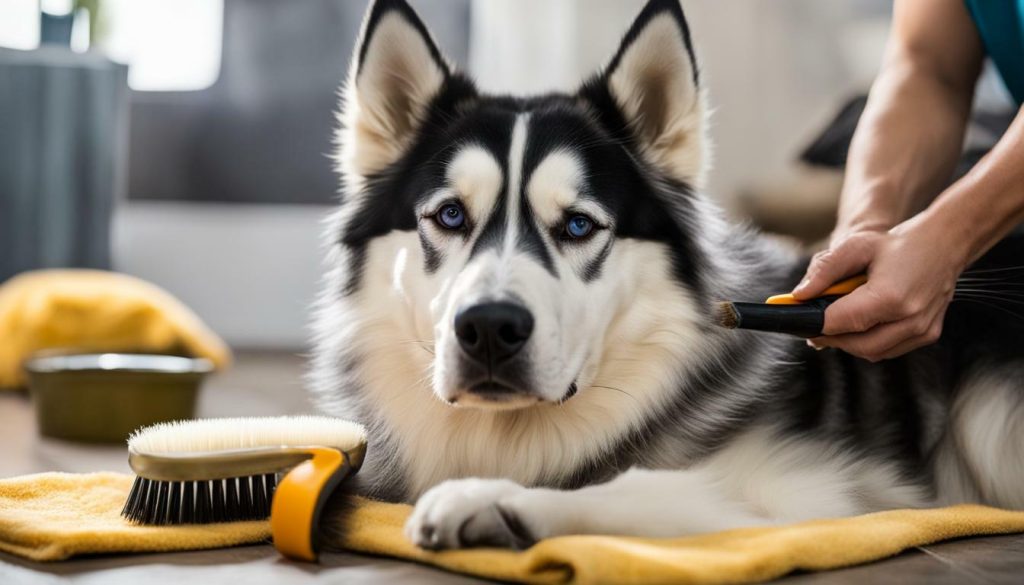
As you can see, there are some differences in grooming and health between Huskies and Dobermans. Consider your lifestyle, grooming preferences, and willingness to provide the necessary care for each breed before making your decision. In the next section, we will delve into the trainability of both breeds, so stay tuned!
Grooming
Huskies have unique grooming needs due to their fluffy double coat, requiring regular maintenance and attention. Their thick fur helps protect them from harsh weather conditions, but it also means they shed quite a bit. They have a process called “blowing their coat,” where they shed their undercoat in large amounts twice a year. During this time, daily brushing is essential to remove the loose fur and prevent matting.
To keep their coat healthy and free from tangles, you should brush your Husky at least once or twice a week. This will help reduce shedding and keep their fur looking beautiful. Additionally, regular bathing is necessary to keep them clean as they tend to get dirty easily. However, be mindful not to over-bathe them as it can strip their fur of its natural oils.
Trimming their nails regularly, cleaning their ears, and brushing their teeth are also part of Husky grooming. Keeping up with these grooming tasks will ensure your Husky stays healthy and comfortable.
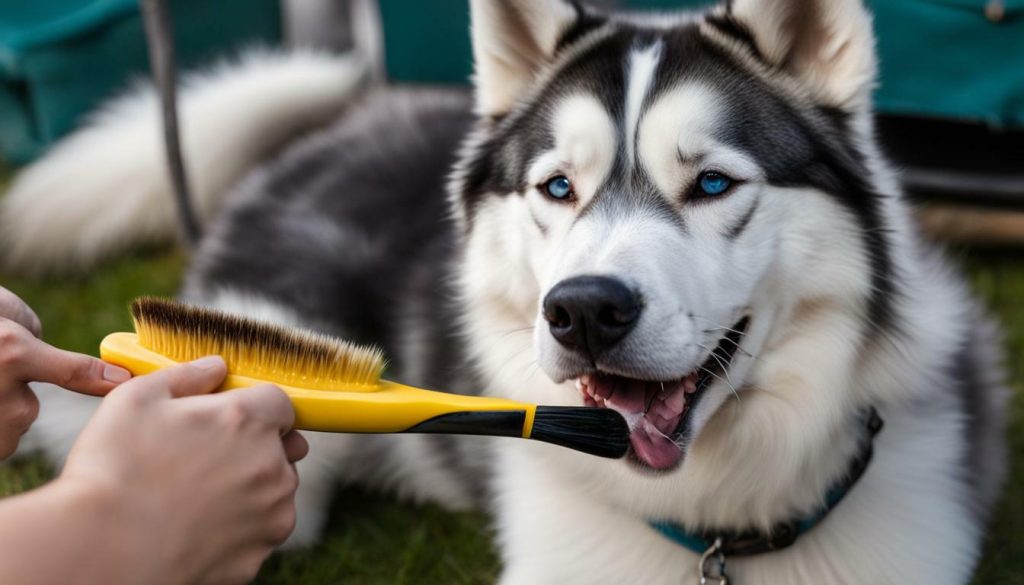
| Husky | Doberman | |
|---|---|---|
| Coat Type | Double coat | Single coat |
| Shedding | Heavy shedding, “blowing coat” twice a year | Minimal shedding throughout the year |
| Brushing Frequency | At least once or twice a week | Weekly brushing |
| Bathing Frequency | As needed, not too frequently | As needed, not too frequently |
| Additional Grooming | Nail trimming, ear cleaning, teeth brushing | Nail trimming, ear cleaning, teeth brushing |
“Regular brushing is essential for Huskies to keep their coats healthy and reduce shedding. Be prepared for the shedding seasons, as they can be quite intense!”
Doberman Grooming and Health
When it comes to grooming, Dobermans have low maintenance needs compared to other breeds. They have a sleek, short coat that sheds gradually throughout the year. This means you won’t have to deal with excessive shedding or frequent brushing sessions. However, regular brushing is still recommended to keep their coat in good condition and minimize loose hair around your home.
Dobermans are generally a healthy breed, but like any dog, they are prone to certain health issues. They have a higher susceptibility to ear infections due to their floppy ears, so it’s important to keep their ears clean and dry. They can also be at risk for bloat, a potentially life-threatening condition, so it’s vital to provide them with small, frequent meals and avoid vigorous exercise before and after meals. Other health concerns include hip dysplasia, prostate cancer, and von Willebrand’s disease. Regular check-ups with a veterinarian and a healthy diet can help maintain their overall well-being.
Overall, Dobermans are relatively low-maintenance in terms of grooming, but it’s essential to be aware of their specific health needs and take proactive measures to keep them healthy and happy. With proper care and attention, your Doberman can thrive and be a loyal and loving companion for years to come.
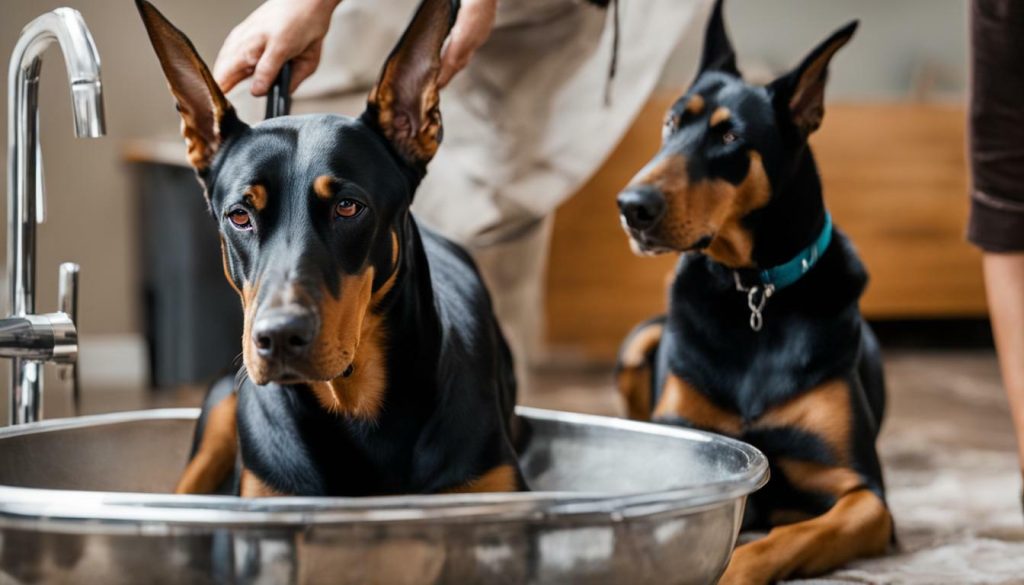
Dobermans have minimal grooming needs with their sleek single coat, making them a low-maintenance choice for pet owners. Their short hair requires little brushing and they shed gradually throughout the year. However, Dobermans are prone to ear infections, so regular ear cleaning is essential to maintain their overall health. Additionally, it’s important to keep their nails trimmed and teeth clean to prevent any potential dental issues. Overall, Dobermans’ grooming requirements are relatively straightforward, making them suitable for individuals looking for a dog with minimal shedding and grooming needs.
Huskies, on the other hand, have moderate grooming needs due to their fluffy double coat. They shed more than Dobermans and require regular brushing to remove loose hair and prevent matting. During shedding season, which typically occurs twice a year, Huskies have a heavy shed, known as “blowing their coat.” This shedding period can be quite intense, and consistent brushing is necessary to keep their coat healthy and manageable. It’s important to note that Huskies’ shedding can be more pronounced if they live in warmer climates, as their thick coat is better suited for colder temperatures. Additionally, Huskies’ ears should be checked regularly for signs of infection, and their teeth and nails should be maintained, similar to Dobermans. Huskies’ grooming needs require more time and effort compared to Dobermans, making them a better fit for owners who are willing to invest in regular grooming sessions.
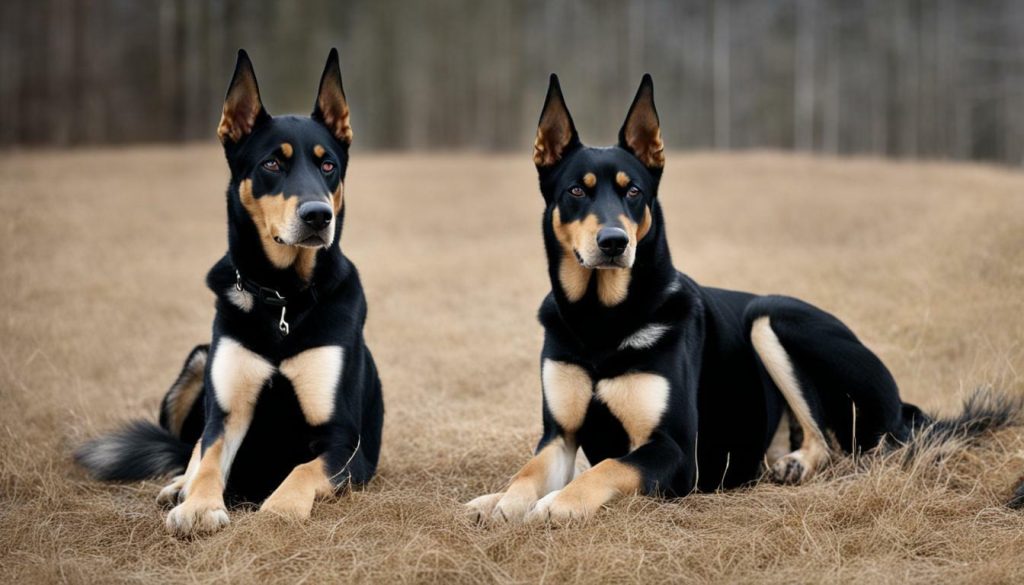
| Doberman | Husky | |
|---|---|---|
| Grooming Needs | Low | Moderate |
| Coat Type | Sleek, single | Fluffy, double |
| Shedding | Gradual | More pronounced, heavy shedding during shedding season |
| Ears | Prone to infections, regular cleaning required | Prone to infections, regular cleaning required |
| Nails and Teeth | Regular maintenance needed | Regular maintenance needed |
When it comes to grooming, Dobermans have minimal needs with their short coat, shedding gradually throughout the year. Huskies, on the other hand, have a moderate grooming requirement due to their fluffy double coat and more pronounced shedding, especially during shedding season. Consider your grooming preferences and the time you are willing to dedicate to grooming when choosing between a Doberman and a Husky.
Welcome to section 13 of our comprehensive guide on choosing the perfect pet in the US. In this section, we will explore the lifespan and general health considerations when comparing Huskies and Dobermans. Let’s dive in and discover the important factors to consider when it comes to the longevity and well-being of these beloved breeds.
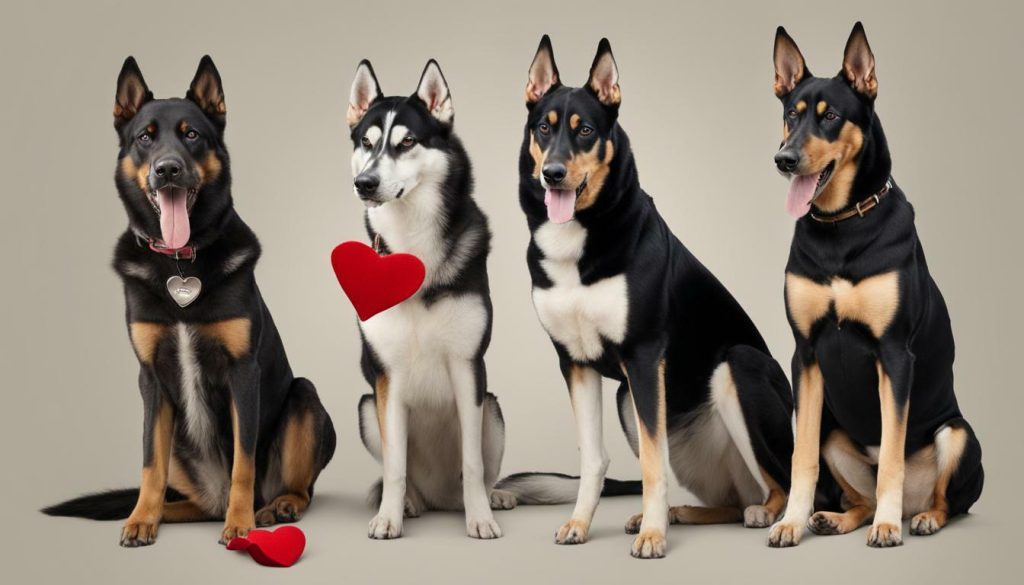
Understanding the lifespan and general health considerations is crucial when considering a Husky or a Doberman as your lifelong companion. Both breeds have an average lifespan of around 10-14 years, although individual dogs may vary. It’s important to recognize that owning a dog is a long-term commitment, and ensuring their well-being is essential.

Dobermans are generally known to be a healthy breed, but they may be prone to certain health issues. Some common health concerns for Dobermans include bloat, a life-threatening condition that requires immediate veterinary attention. They are also more susceptible to prostate cancer, hip dysplasia, von Willebrand’s disease, and heart disease. Regular veterinary check-ups and early detection of any potential health problems are important for maintaining their overall well-being.
Huskies are generally a healthy breed with fewer specific health concerns. However, like most breeds, they may be prone to certain conditions such as hip dysplasia, hypothyroidism, and eye disorders. Regular exercise, a balanced diet, and routine veterinary care are crucial for keeping your Husky healthy and happy.
Table comparing Husky and Doberman Lifespan and Health:
| Breed | Lifespan | Common Health Issues |
|---|---|---|
| Husky | 10-14 years | Hip dysplasia, hypothyroidism, eye disorders |
| Doberman | 10-14 years | Bloat, prostate cancer, hip dysplasia, von Willebrand’s disease, heart disease |
Ensuring regular veterinary care, a balanced diet, exercise, and a loving environment is essential for both Huskies and Dobermans to live long and healthy lives. Regular check-ups, vaccinations, and preventive care help identify any potential health issues and treat them promptly.
Welcome to section 15 of our article, “Husky vs. Doberman: Choosing Your Perfect Pet in the US.” In this section, we will explore the sociability and compatibility of Huskies. If you’re considering adding a Husky to your family, it’s important to understand their social nature and how well they interact with other dogs and children. Let’s dive in!
Sociability: Huskies vs. Dobermans
Huskies are known for their sociable and friendly disposition, making them an excellent choice for families and households with other pets. They have a natural affinity for people and are typically good around children, often described as gentle and affectionate. Their social nature extends to other dogs as well, as they were bred to work together in packs, resulting in a strong sense of camaraderie.
Dobermans, on the other hand, are known for their loyalty and deep bond with their families. While they can be sociable and friendly with familiar faces, they may not tolerate strangers or other pets as easily as Huskies. Dobermans have a strong protective instinct, making them vigilant and watchful guardians. This can translate into a higher level of caution, especially when encountering unfamiliar individuals or animals.
“Both Huskies and Dobermans have their own unique sociability traits. While Huskies are generally friendly and sociable towards everyone, Dobermans can be more reserved and discerning in their interactions. It’s important to consider your household dynamics and the specific sociability requirements you are looking for in a pet.”
Choosing the Right Companion
When deciding between a Husky and a Doberman, it’s crucial to consider your lifestyle, family dynamics, and the environment in which you live. If you have a busy, active household with children and other pets, a sociable and affectionate Husky may be the perfect fit. Their friendly nature and pack-oriented instincts make them a natural addition to a social and bustling household.
If you are seeking a loyal and protective companion, and prefer a dog that is more reserved with strangers and other animals, a Doberman may be the ideal choice for you. Their instinctive guarding abilities, combined with their loyalty and intelligence, make them suitable for individuals looking for a vigilant and devoted companion.
Ultimately, the decision between a Husky and a Doberman comes down to personal preferences and the specific needs of your household. Both breeds offer unique sociability traits and have different requirements for social interactions. It’s important to prioritize factors such as activity level, grooming needs, and compatibility with children and other pets to ensure a harmonious and fulfilling relationship with your furry companion.
Lifespan and General Health
When considering the lifespan and overall health of Huskies and Dobermans, it’s essential to understand the average life expectancy and potential health concerns associated with each breed.
Both Huskies and Dobermans have a similar lifespan, which typically ranges from 10 to 14 years. However, it’s important to note that individual lifespan may vary depending on various factors, including genetics, diet, exercise, and overall care.
Huskies are generally healthy dogs, but they may be prone to certain health issues. Some common health concerns in Huskies include hip dysplasia, hypothyroidism, and eye disorders such as cataracts and progressive retinal atrophy. Regular veterinary check-ups and proper care can help manage these conditions and ensure the overall well-being of your Husky.
Similarly, Dobermans are generally healthy dogs, but they may be susceptible to specific health issues. Some common health concerns in Dobermans include bloat, hip dysplasia, von Willebrand’s disease, and certain cancers. Routine medical examinations, a balanced diet, and regular exercise can help reduce the risk of these conditions and promote a healthy and happy life for your Doberman.
It’s important to consult with a reputable veterinarian for comprehensive guidance on preventive care, nutrition, and potential health issues specific to each breed. Additionally, staying informed about breed-specific health concerns and taking proactive measures can help ensure the long-term well-being of your beloved pet.
| Breed | Average Lifespan | Common Health Concerns |
|---|---|---|
| Husky | 10-14 years | Hip dysplasia, hypothyroidism, eye disorders |
| Doberman | 10-14 years | Bloat, hip dysplasia, von Willebrand’s disease, certain cancers |
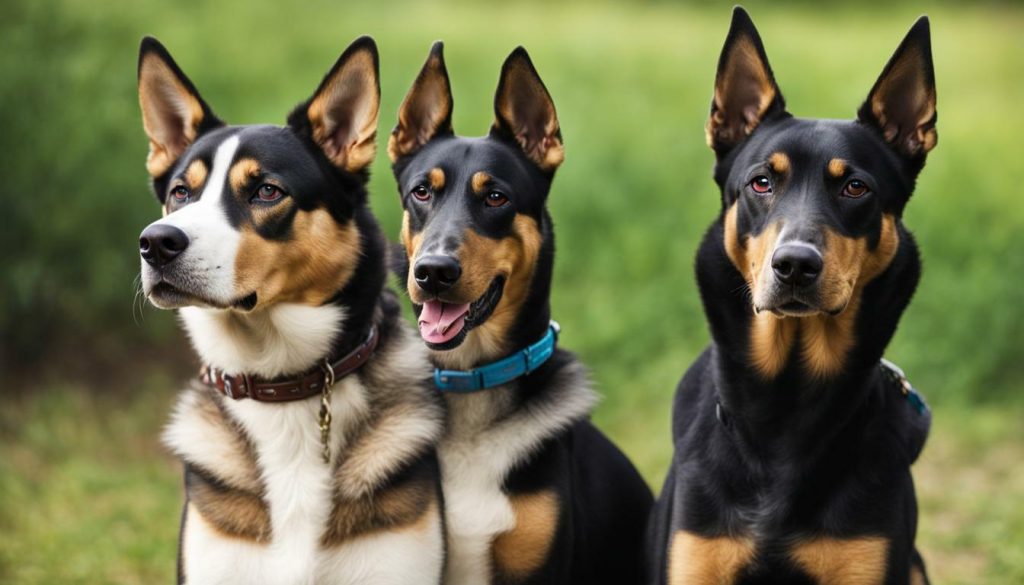
When selecting a Husky or a Doberman, it’s crucial to prioritize the health and well-being of your future companion. Researching and understanding breed-specific health concerns can help you make an informed decision and take appropriate measures to ensure a healthy and fulfilling life for your pet.
Remember to provide routine veterinary care, a balanced diet, regular exercise, and a loving and nurturing environment to promote overall health and longevity. By prioritizing preventive care and addressing any health issues promptly, you can maximize the quality of life for your beloved Husky or Doberman and create lasting memories together.
Doberman Sociability and Compatibility
Dobermans are highly intelligent, athletic, and alert, making them great guard dogs. They are loyal and affectionate towards their families. Dobermans have a history as police and military dogs and can also work as therapy, service, and emotional support animals.
Huskies are energetic dogs that are known for their loyalty. They are sociable with other dogs and children. Huskies were bred to work together in a pack and are fast runners.
When comparing the two breeds, there are some differences in grooming, health, and trainability. Dobermans have low grooming needs with a single coat that sheds gradually throughout the year. They are prone to ear infections and have a higher susceptibility to certain health issues such as bloat, prostate cancer, hip dysplasia, and von Willebrand’s disease.
Huskies have moderate grooming needs due to their fluffy double coat. They shed more than Dobermans and require regular brushing. They are generally healthy but may be susceptible to hip dysplasia, hypothyroidism, and eye disorders.
Both breeds are active and have a lifespan of around 10-14 years. Dobermans are easier to train, while Huskies can be more stubborn. Huskies are sociable and friendly towards everyone, while Dobermans may not tolerate strangers or other pets as well.
Ultimately, the choice between a Husky and a Doberman depends on individual preferences and the environment. Huskies are better for active owners in colder climates, while Dobermans are a good choice for those looking for a short-haired dog with minimal shedding. It’s important to consider the specific needs and characteristics of each breed before making a decision.
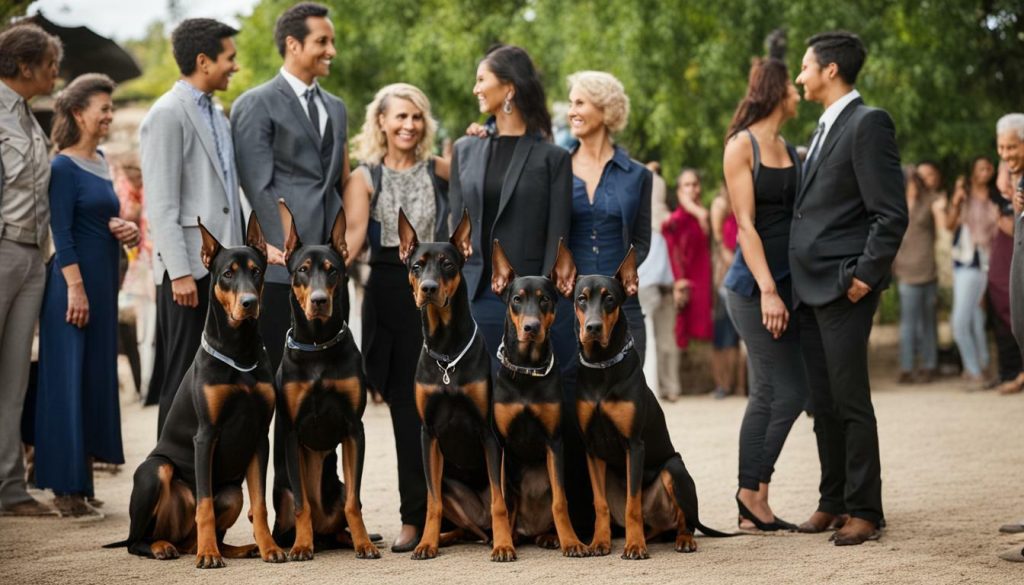
Dobermans are renowned for their loyalty and protective nature, making them an ideal choice for those seeking a vigilant and devoted companion. They are known to form strong bonds with their families and are often protective of their loved ones. However, Dobermans may not tolerate strangers or other pets as well, which makes early socialization an important aspect of their training. With proper socialization, they can learn to distinguish between friend and foe and become more accepting of new people and animals.
Huskies, on the other hand, are known for their friendly and sociable nature. They are typically good with children and other dogs, making them an excellent choice for families. Huskies were bred to work together in a pack, which has given them a cooperative and sociable temperament. They thrive on human companionship and enjoy being part of a family environment. Their sociable nature makes them well-suited to households with multiple pets and a bustling social life.
Table: Sociability Comparison
| Doberman | Husky | |
|---|---|---|
| Loyalty | High | High |
| Protectiveness | High | Medium |
| Sociability with Strangers | Low | High |
| Sociability with Other Pets | Low | High |
While Dobermans may take more time to warm up to strangers and other pets, their loyalty and protective nature make them an excellent choice for individuals seeking a devoted and watchful companion. With proper training and socialization, Dobermans can learn to be accepting of new people and animals. On the other hand, Huskies’ sociable and friendly nature allows them to be more accepting of strangers and other pets, making them a great addition to households with multiple pets or a lively social life.
When considering the sociability of these breeds, it is important to assess your own lifestyle, living environment, and the time you can dedicate to training and socializing your pet. Both Dobermans and Huskies can make loyal and loving companions, but their differing sociability traits may impact their compatibility with your specific circumstances.
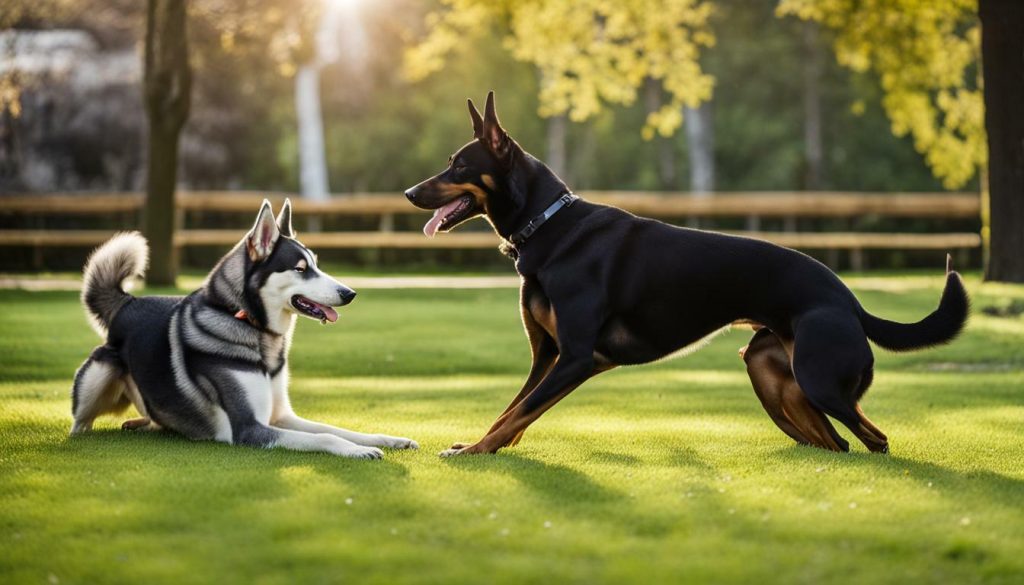
Selecting the right pet involves considering various factors, including breed-specific traits, lifestyle needs, and compatibility with your family and environment.
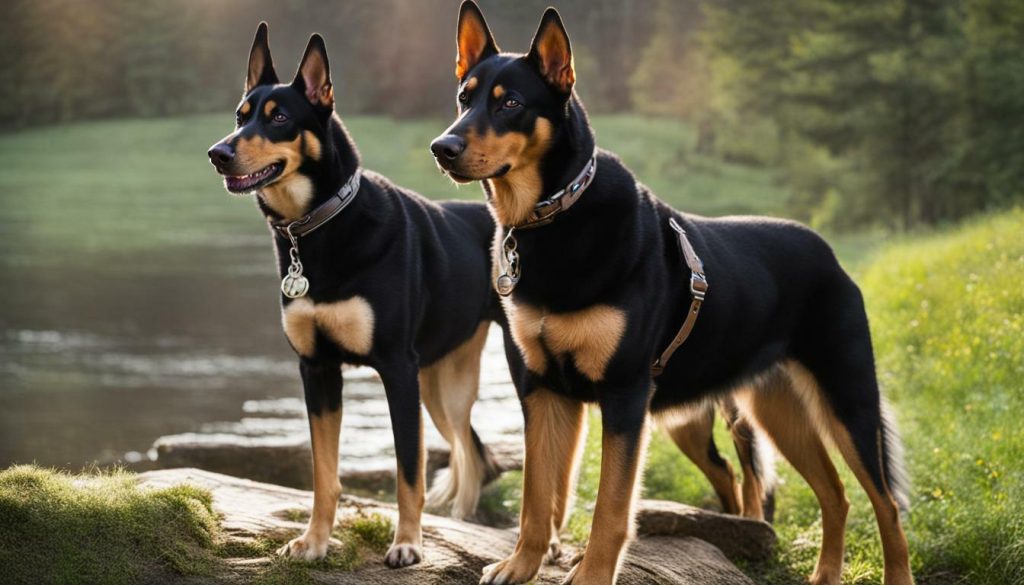
When it comes to selecting the perfect pet, the choice between a Husky and a Doberman can be a tough one. These two breeds have distinct characteristics and qualities that may appeal to different individuals. To make an informed decision, it’s important to compare and contrast their differences and similarities while considering your own preferences and circumstances.
Let’s start by examining the physical characteristics of both breeds. Size is a significant factor to consider. Huskies are medium-sized dogs, typically weighing between 35 to 60 pounds. On the other hand, Dobermans are larger and more muscular, weighing between 60 to 100 pounds. If you have limited space or prefer a smaller dog, a Husky might be the better choice. However, if you are looking for a larger and more imposing companion, a Doberman might be the right fit for you.
Temperament is another crucial aspect to consider. Huskies are known for their friendly and sociable nature. They are usually good with children and get along well with other dogs. Dobermans, on the other hand, can be more reserved and protective. They are fiercely loyal to their families but may be cautious around strangers. If you are seeking a dog that readily welcomes new people and animals into your home, a Husky might be the better option. However, if you value a strong and protective companion, a Doberman might be more suitable.
Trainability and exercise needs should also be factored in. Huskies are intelligent but can be independent and stubborn, making training a bit more challenging. They require ample mental and physical stimulation to prevent boredom and destructive behavior. Dobermans, on the other hand, are highly trainable and eager to please their owners. They excel in obedience training and thrive on mental stimulation. If you are an experienced dog owner looking for a highly trainable dog, a Doberman may be the better choice.
Grooming and health considerations are essential as well. Huskies have a thick double coat that requires regular brushing to manage shedding. They are generally healthy but may be prone to hip dysplasia and hypothyroidism. Dobermans, with their short coat, have lower grooming needs and shed minimally. They are more susceptible to certain health issues such as bloat and hip dysplasia. If you prefer a dog with minimal shedding, a Doberman might be more suitable.
By weighing these factors – size, temperament, trainability, exercise needs, grooming, and health – you can determine which breed aligns best with your preferences and lifestyle. It’s important to remember that individual personalities can also vary, so spending time with individual Huskies and Dobermans can provide valuable insights into their specific temperaments and compatibility with your family.
Remember, owning a dog is a long-term commitment, and choosing the right breed is crucial to ensure a harmonious and fulfilling companionship. Take the time to research, ask questions, and consider your own needs and capabilities before making a decision. When armed with knowledge and understanding, you’ll be better equipped to choose between a Husky and a Doberman, ultimately finding the perfect pet for you and your family.
Conclusion: Making the Right Choice
Ultimately, the decision between a Husky and a Doberman rests on your personal preferences, lifestyle, and ability to meet their specific needs. Both breeds offer unique qualities and characteristics that can make them great companions, but it’s important to consider several factors before making a final decision.
Grooming and Health
Dobermans have low grooming needs with a single coat that sheds gradually throughout the year. They are generally healthy but may be more prone to certain health issues like bloat, prostate cancer, hip dysplasia, and von Willebrand’s disease. On the other hand, Huskies have moderate grooming needs due to their fluffy double coat. They shed more and require regular brushing. While they are generally healthy, they may be susceptible to hip dysplasia, hypothyroidism, and eye disorders.
Trainability and Temperament
Dobermans are highly trainable dogs, known for their intelligence and eagerness to please their owners. They are known to excel in obedience training and can be well-behaved in various environments. Huskies, on the other hand, can be more stubborn and independent. They may require consistent training and a patient approach. In terms of temperament, Dobermans are loyal and affectionate towards their families but may not tolerate strangers or other pets as well. Huskies, on the other hand, are sociable and friendly towards everyone, including other dogs and children.
Activity Level and Compatibility
Both Huskies and Dobermans are active breeds that require regular exercise. Huskies are known for their energy and love for running, making them a great fit for active owners. They particularly thrive in colder climates. Dobermans, on the other hand, are athletic dogs that need physical and mental stimulation to prevent boredom. They are a good choice for individuals looking for a short-haired dog with minimal shedding. When it comes to compatibility, Huskies are generally sociable with other dogs and children, while Dobermans may need proper socialization and may not always tolerate strangers or other pets.
By considering these factors, you can make an informed decision and choose the breed that aligns with your lifestyle and preferences. Whether you opt for the energetic and sociable Husky or the loyal and protective Doberman, both breeds have their own unique qualities that can bring joy and companionship to your life. Remember, responsible pet ownership requires dedication and commitment, so choose wisely and enjoy the rewarding experience of owning a Husky or a Doberman.
FAQ
Q: Are Huskies better for active owners in colder climates?
A: Yes, Huskies are well-suited for active owners in colder climates due to their thick double coats and stamina in cold weather.
Q: Do Dobermans make good guard dogs?
A: Yes, Dobermans are highly intelligent, alert, and loyal, making them great guard dogs.
Q: Which breed is easier to train, Huskies or Dobermans?
A: Dobermans are generally easier to train compared to Huskies, as they are highly intelligent and eager to please their owners.
Q: Do Huskies get along well with other dogs and children?
A: Yes, Huskies are sociable dogs and often get along well with other dogs and children.
Q: What are the grooming needs of a Husky?
A: Huskies have moderate grooming needs due to their fluffy double coat. They require regular brushing to manage shedding.
Q: Do Dobermans shed a lot?
A: Dobermans have low grooming needs and shed gradually throughout the year.
Q: What are the common health issues for Huskies?
A: Huskies may be susceptible to hip dysplasia, hypothyroidism, and eye disorders.
Q: Are Dobermans prone to any particular health issues?
A: Dobermans have a higher susceptibility to certain health issues such as bloat, prostate cancer, hip dysplasia, and von Willebrand’s disease.
Q: What is the lifespan of Huskies and Dobermans?
A: Both Huskies and Dobermans have an average lifespan of around 10-14 years.
Q: Are Huskies friendly towards strangers?
A: Huskies are generally friendly and sociable towards everyone, including strangers.
Q: How do Dobermans respond to strangers and other pets?
A: Dobermans may not tolerate strangers or other pets as well as Huskies due to their protective instincts.
